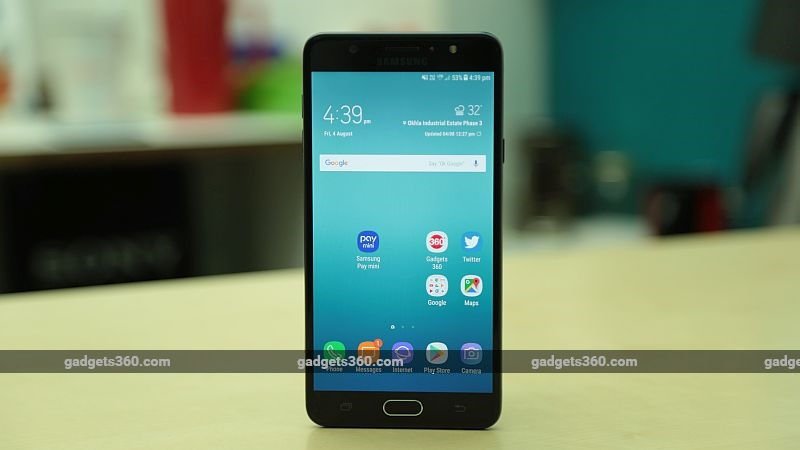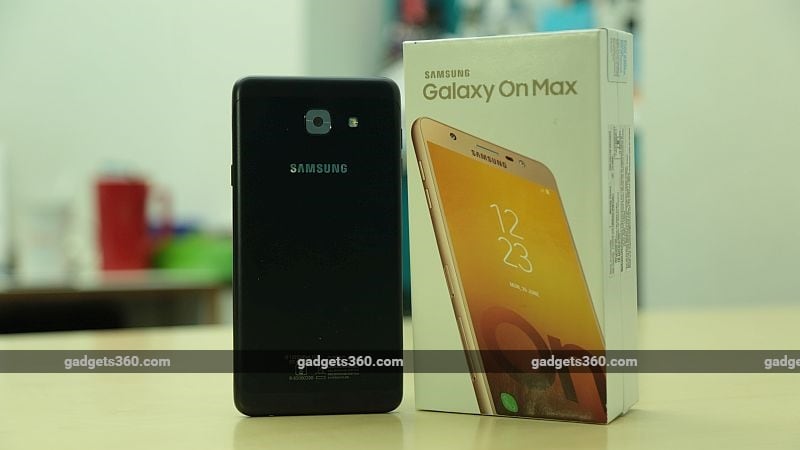

A good camera is a prerequisite for anyone buying a smartphone today. We keep getting asked by our readers to recommend smartphones at every price point that can take great photos. Phones priced well under Rs. 20,000 such as the Moto G5 Plus (Review), Xiaomi Mi Max 2(Review), and Oppo F3 (Review) can take good photos in daylight but usually can’t match the same level of quality in low light. Samsung claims that the Galaxy On Max is the answer to this common problem.
The smartphone was unveiled in India last month and supports Samsung Pay Mini, the company’s own mobile payments service. A few of its other highlights are the front flash, f/1.7 aperture, and Android Nougat. The Samsung Galaxy On Max has been priced aggressively to take on heavyweights in the sub-Rs. 20,000 price segment. Can Samsung pull off this impressive feat? We find out.
Samsung Galaxy On Max design
Samsung phones have been criticised over the years for sticking to the same design across different price segments. The company has made some conscious changes to the design of its premium models starting with the Samsung Galaxy S6 (Review), through the Samsung Galaxy S7 (Review), and now the dramatically different Samsung Galaxy S8 (Review). Thankfully, the company hasn’t entirely forgotten its mid-range offerings which have also received some minor changes.
The Galaxy On Max looks premium for its price, and will definitely leave a positive first impression. It features a 5.7-inch display but it feels roughly the same size as a 5.5-inch device and much smaller than the 5.5-inch iPhone 7 Plus. The slim borders on the sides of the display make the screen stand out, and the finish feels solid. There’s the signature oval Samsung home button at the front which has a silver lining and an integrated fingerprint scanner, and there are capacitive Back and Overview buttons on either side.
Unfortunately, the capacitive keys are not backlit which means you might have difficulty using them in the dark. The power and volume buttons are positioned well and are easy to use. You get dedicated SIM and microSD card slots, which we appreciate. The rear camera is enclosed in a squarish bump which is now a common design touch across many Samsung phones. The 3.5mm audio jack and Micro-USB port are on the bottom.
The On Max is 8.1mm thick, but feels slim for a phone of this size. It also weighs slightly more than most 5.5-inch phones, at 179g, which becomes evident after long phone calls. You also won’t want to use this device one-handed for very long. The rounded corners make it comfortable, but the metal is quite slippery. During our review period, we nearly dropped the Galaxy On Max while attempting to take photos with it because of the smooth metallic back. Our suggestion would be to use a cover for protection.

We really like Samsung’s attention to detail with the Galaxy On Max. It might feel a bit too big for some people, and the metal unibody is quite slippery. We would have liked to have a notification LED, but this is missing. Also, we found that the display is a fingerprint magnet and we had to wipe it from time-to-time. Overall, the Samsung Galaxy On Max might not have a dramatic new design, but it does feel premium for its price. It has been launched in gold and black colours – we got the latter for our review.
Inside the retail box of the Samsung Galaxy On Max you get a charger, earphones, Micro-USB cable, SIM ejector tool, and standard documentation, apart from the phone itself.
Samsung Galaxy On Max specifications and software
The Samsung Galaxy On Max features a 5.7-inch full-HD (1080×1920 pixels) screen. It is powered by an octa-core MediaTek Helio P25 (MT6757V) processor with four cores clocked at 2.39GHz and four cores clocked at 1.69GHz, coupled with 4GB of RAM. There’s 32GB of storage on the device, and it supports expansion using a microSD card of up to 256GB.
The most marketed feature of the Galaxy On Max is its camera performance. The phone ships with 13-megapixel sensors and LED flashes on the back as well as the front. The rear camera has an f/1.7 aperture which the company says improves low-light shots, while the one in front gets an f/1.9 aperture. For connectivity, the Galaxy On Max has 4G with VoLTE (Voice over LTE), Wi-Fi, Bluetooth, a 3.5mm audio jack, and a Micro-USB port. It packs a 3300mAh non-removable battery.
You get Android 7.0 with Samsung’s own custom UX which has gradually improved over the last few years. Samsung phones have seen tremendous reductions in bloatware, which feels good. Interestingly, the Samsung Galaxy A7 (2017) and Galaxy A5 (2017) (Review) – both of which cost more than the Galaxy On Max – are still running Android Marshmallow.

One of the biggest software-related features of this phone is Samsung Pay mini, which launched in India in June with the Samsung Galaxy J7 Pro and Galaxy J7 Max. The Samsung Pay mini app is preloaded on the device. It allows you to make UPI payments and integrates mobile wallets. Unfortunately, the mini version of Samsung Pay excludes NFC and MST tap-to-pay features which require additional hardware. We used Samsung Pay mini with Paytm and Mobikwik wallets and found it functional though we missed the card payments feature which would’ve allowed us to leave our debit and credit cards at home.
As expected, the Galaxy On Max supports all Nougat-specific features such as split-screen multitasking, quick toggles, a new Settings app, and bundled notifications, to name a few. We liked the 3D Touch-like feature which shows contextual options on long-pressing a supported app’s icon.
Those who feel that the 5.7-inch screen is too big can use the One-handed mode that shrinks the display area. You will need to enable the mode from the Settings app, after which a swipe up diagonally from either lower corner of the screen or a triple-click of the Home button will toggle it. There’s also a Dual Messenger feature which automatically shows up for supported apps like WhatsApp, Facebook, Telegram, Instagram, and Gmail among others. It lets users set up two accounts simultaneously on the same device. Other features like Secure Folder have also made it to the Galaxy On Max. The Secure Folder basically blocks unauthorised access to photos, notes, and even apps on the phone.
There are also some neat shortcuts like the ability to double-tap the home button to launch the camera anytime, which came in handy for quick shots. The Ultra Data Saving mode prevents apps from using data in the background unless whitelisted by the user. Samsung has also included face recognition which makes it the only device in its segment to sport such a feature. Our review unit did not support Google Assistant at first, but it was enabled by a software update that we received during the review period.

Other Samsung-specific apps like S Secure, Samsung Health, Galaxy Apps, Samsung Themes, and Samsung Notes are also present. Our unit also shipped with Opera Max, Google Play Music, Google Home, and a suite of Microsoft apps preinstalled. Overall, we felt that Samsung’s new interface is much more polished than previous iterations. The software enhancements on the Galaxy On Max really add a lot to the user experience.
Samsung Galaxy On Max performance and camera
In day-to-day use, the Galaxy On Max fares well and handles multitasking with ease. Switching from one app to the other works smoothly and there’s around 1.8GB of RAM free out of the 4GB at any given time. We used the Galaxy On Max extensively for GPS navigation, photography and gaming, with 4G data active throughout, but didn’t have much trouble with the phone overheating, which is good.
The only thing that the phone slightly struggled with was playing graphics-heavy games such as Asphalt 8 and Marvel: Contest of Champions. We noticed that the phone would seem to freeze momentarily, but it did recover. The Galaxy On Max scored 61,644 in AnTuTu, 23fps in GFXBench, and 8,220 in 3DMark Ice Storm Extreme. Overall, these are pretty decent benchmark scores for this price segment, but not the best.
The full-HD screen on the Galaxy On Max was a pleasure to use in different conditions. It has good brightness and colours are punchy. The best thing about the display is that it can get really bright and really dim which is great for use at night. We loved watching videos on the Galaxy On Max thanks to the 5.7-inch screen and slim borders. Our sample videos ran smoothly without any problems, and the speaker placed on the right is good enough if you aren’t in a group. There was a lot of distortion at the maximum volume level. We liked the placement of the speaker but we would have liked stereo speakers on this phone. The bundled earphones were good enough in terms of quality but kept falling out of our ears, though your mileage may vary.
The face recognition feature worked great during our review period. We were able to unlock the device in the daytime with no trouble, but performance was much less consistent in dim light. We have to commend Samsung for adding this feature, which should up the ante for other manufacturers. The fingerprint scanner is a good fallback in low-light conditions.
The phone supports VoLTE which means you can make calls using the Jio network. We noticed that the phone easily latched onto 4G networks wherever available. The same goes for Wi-Fi connectivity which worked smoothly even in zones with patchy coverage. Call quality on the handset was good enough.
The 13-megapixel rear camera does a good job in various situations. In broad daylight, the samples showed rich textures with good amounts of detail. Focusing was really quick and worked flawlessly. Colours were vibrant and exposure levels were spot on. Macro and landscape shots captured in daylight also showed good amounts of detail.



 Tap to see full-sized Samsung Galaxy On Max camera samples
Tap to see full-sized Samsung Galaxy On Max camera samples
The rear camera has an f/1.7 aperture lens like the Galaxy S7 and Galaxy S8, and the company says this should drastically improve low-light results. In real world usage, it didn’t disappoint us. The camera was able to take some decent night shots with good details and controlled noise at the corners. The results were impressive unless the subject was completely in shadow. However, we felt that focusing was somewhat less accurate in low light. Shots had some amount of noise but performance was still better than what other phones at this price level can manage.
The 13-megapixel front camera does a good job of capturing selfies in different situations. The camera app provides options to change skin tone, make faces slimmer, and enlarge eyes – features that some people might find useful. We also found the front flash to be functional in illuminating faces when taking selfies in the dark. The phone supports up to 1080p video recording which works well, and won’t let you down. We would have liked 4K video recording but that seems to be reserved as a flagship feature. Overall, we found that both cameras are great in terms of colour reproduction and performance in low light.
The camera app on the Samsung Galaxy On Max is easy to use, and all options are just a tap away. You can swipe right to show a wide array of options. The Pro mode lets you manually change shutter speed, ISO, exposure compensation, focus, and white balance. There are also Panorama, Continuous Shot Anti Fog, Night, and HDR modes. The smartphone offers real-time camera filters that can be accessed with a swipe to the left. The Social Camera mode offers instant sharing to popular social media platforms including Facebook, WhatsApp, Messenger, and Twitter. It also gives you real-time stickers to use while taking photos, as well as tools to edit shots after you take them.
Samsung Galaxy On Max battery life
The 3300mAh battery on the Samsung Galaxy On Max managed to last for roughly 16 hours of heavy usage and much more with medium to light use. Apps like WhatsApp, the default email app, Facebook, Twitter, Telegram, Slack, and Instagram were running in the background during the entire review period. The Galaxy On Max has multiple power-saving features such as Reserve Battery For Calls which makes sure there’s enough juice left to make a few calls. With these options enabled we were able to use the handset for over a day but with limited app usage.
In our standard HD video loop test, the Galaxy On Max lasted for 10 hours and 7 minutes before the battery died on us, which isn’t impressive considering the size of this battery. Phones with similar battery sizes have done better than the Galaxy On Max. Samsung is not promoting any fast charging tech for the Galaxy On Max but we found that it can charge fully in almost 90 minutes which isn’t bad.

Samsung Galaxy On Max in pictures
Verdict
The Samsung Galaxy On Max is now available to buy on Flipkart for Rs. 16,900. Its performance is good enough and you won’t find it underpowered. It has a large display which is great for entertainment. In our opinion, the Galaxy On Max packs the best camera at this price level. If you want a smartphone that offers a decent set of cameras, then the Galaxy On Max should be high on your list of choices. Samsung has also delivered the Android Nougat experience, and the interface is more polished than ever before. The Galaxy On Max also checks all the boxes when you consider battery performance and design. Apart from gaming performance, you should be satisfied with what you get.
However, the company’s very own Samsung Galaxy J7 Max packs slightly better specs and is only a little more expensive. If you don’t want to spend more, you could also go with the Moto G5 Plus (Review), Xiaomi Mi Max 2 (Review), or Oppo F3 (Review) as alternatives.
For the latest tech news and reviews, follow Gadgets 360 on Twitter, Facebook, and subscribe to our YouTube channel.
Affiliate links may be automatically generated – see our ethics statement for details.





